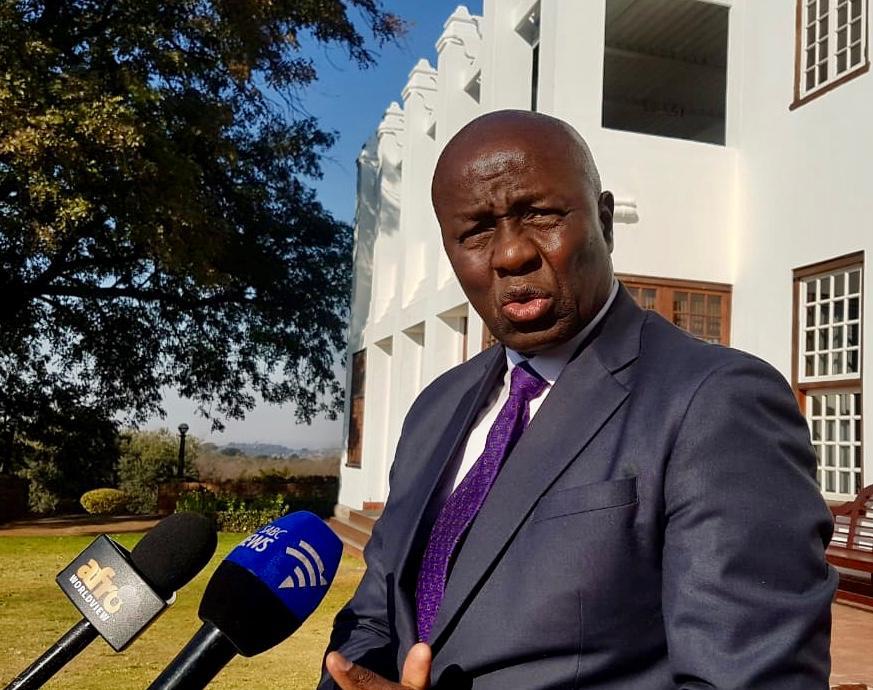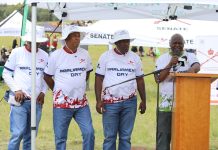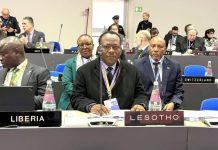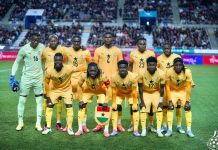Africa-Press – Lesotho. The controversy surrounding Clause 10 of the 2018 Memorandum of Understanding (MOU) between government and opposition parties deepened this week when judges questioned its status.
Justice Semapo Peete on Monday questioned the legal status of the clause in the ongoing debate before the High Court (sitting as the Constitutional Court), seeking clarity on whether the clause was ever elevated to the status of law.
“What is the legal status of this clause? Were its authors making law? Is it the concern of this court to declare an agreement between parties unconstitutional?” he asked.
The questions were posed to Advocate Motiea Teele KC, a lawyer representing Lesotho Congress for Democracy (LCD) and Movement for Economic Change (MEC) leaders, Mothetjoa Metsing and Selibe Mochoboroane in the constitutional challenge to the impugned clause.
They two politicians are challenging their indictment before the High Court after treason charges were preferred against them. The country’s prosecuting authority, Director of Public Prosecutions Advocate Hlalefang Motinyane, is accusing the two of involvement in the 2014 events leading to the collapse of former Prime Minister Motsoahae Thabane’s government.
They appeared before High Court Justice Onkemetse Tshosa on March 2 but could not be formally charged because of the constitutional challenge to their indictment.
The duo is to be joined along with retired army commander, Lieutenant General Tlali Kamoli and four other soldiers who are already in detention. The soldiers have been charged with the murder of police Sub-Inspector Mokheseng Ramahloko and it is expected treason charges will also be preferred against them.
However, Metsing and Mochoboroane argue government is bound by the 2018 MOU between government and opposition, therefore treason charges against them should be put on hold.
Clause 10 of the MOU states that Metsing and similarly placed persons with him will not be subject to prosecution during the ongoing National Reforms process.
The Constitutional Court comprising; Justices ’Maseforo Mahase (ACJ), Molefi Makara and Semapo Peete in 2018 nullified the clause for being discriminatory.
This was after it was challenged by former army boss, Lieutenant General Maaparankoe Mahao’s family, Police Constable (PC) Mokalekale Khetheng’s family and one Tebello Senatla.
Despite the Constitutional Court ruling, the SADC facilitation team to Lesotho through its special envoy – Justice Dikgang Moseneke – said Lesotho should ensure compliance with the 2018 MOU, including the impugned clause.
He (Justice Moseneke) on March 29 wrote to former Prime Minister Thabane urging him to ensure the government complied with the MOU. He wrote the letter after realising Metsing and Mochoboroane are facing treason charges.
Part of his letter read: “No political leaders should be charged or prosecuted until the dialogue and reforms process in the Kingdom of Lesotho has been duly and fully completed.
” In a bid to avoid the charges, Metsing and Mochoboroane now want the court to rescind its judgment.
They have attached Justice Moseneke’s letter to their court papers and say rescission is necessary having not been cited when clause 10 was nullified. They were not parties to the previous application and therefore want to intervene so as to oppose it.
Rescission will ensure that the clause remains in effect, thereby ensuring that the two leaders are immune to prosecution, at least until reforms are complete.
During the arguments on Monday, Acting Chief Justice (ACJ) asked Advocate Teele: “What does SADC recommendations say about those implicated in criminal offences? Don’t they say such people should be charged?” Teele responded that while recommendations say those implicated should be charged, they should be read in context including Justice Moseneke’s letter in which he urged that his clients’ prosecution should be put on hold.
Teele said SADC’s decisions are carried by different offices designated as such, and therefore Justice Moseneke is one such adding Lesotho cannot ignore SADC decisions.
Further, Justice Mahase expressed concern that Justice Moseneke’s letter conveniently surfaced at a time when there are other people who have to be charged as per SADC recommendations and also that it appears months after the court had ruled on the clause.
She also asked whether Judge Moseneke’s letter was endorsed by SADC as it bears only his signature, not that of any other SADC dignitary. “Why have SADC not sat down and make it in clear terms that an amendment has been made to its recommendations to Lesotho? I am also aware of the fact that Judge Moseneke’s letter surfaces some months after we have passed judgment on the matter.
”
Judge Mahase added: “He states in his letter that he had recently learned about treason charges, whether he knows judgment has been available some 13 months ago, we do not know.
” Judge Peete weighed in and said he is of the opinion that an amendment to the clause would seek to solve the long-drawn litigation. He proposed inclusion of “without prejudice to the constitution” that he said would solve the challenges if added to the clause.
Advocate Teele replied that there is nothing convenient about Judge Moseneke’s letter but that it a SADC document that the court should accept. He told the court that the reading of the letter indicates that it has SADC’s blessing and that if the court accepts to rescind its judgment, they will seek affidavits from SADC authorities, including Moseneke.
For his part, Justice Makara questioned Judge Moseneke’s remark in the letter when he said “it should be stated clearly that any action or process in contravention of the letter and the spirit of the MOU, signed on 16 October, 2018, will not be welcomed by the Southern African Development Community (SADC).
” Justice Makara posed the question: “Can a judicial officer despite a pending matter in court make such a statement?” The judge also asked the authority judge Moseneke was banking on to make such a statement to which Teele replied it was a matter of urgency.
Advocate Teele said judge Moseneke understood that modern government communicates with not only departments but also arms of government and that his letter does not say how the decision should be make on the charges.
Teele also argued that in suggesting that prosecution be put on hold until reforms have been completed, Clause 10 does not interfere with the powers conferred upon the DPP in terms of the constitution.
He said it is the duty of government to voice its concern to the DPP if it feels it is in the interest of justice that charges be put on hold. Advocate Christopher Lephuthing maintained that Justice Moseneke would not have authored the letter aware of the court’s ruling that clause 10 had been declared unconstitutional.
Lephuthing represents the DPP in the matter. He said it was bizarre that complainants want the court to agree to delay their trial yet at the same time they complain that the trial has been delayed since 2014 and are only being charged now.
Lephuthing said all Metsing and Mochoboroane complain about should have been raised before the trial judge (Judge Tshosa) who would hear all their complaints.
Lephuthing told the court that in its recommendations to Lesotho the SADC made it clear that those implicated should be prosecuted using best international standards and best standards.
Lephuthing added this meant equality before the law and that selective justice needs to be avoided. “It will not be in the interest of justice that Mr Metsing and Mr Mochoboroane be separated from Mr Kamoli who is in detention as we speak; we cannot operate like that,” he continued.
Lephuthing also dismissed Metsing and Mochoboroane’s submission that their trial be put on hold for them to participate in the reforms. He told the court both Metsing and Mochoboroane are not members of the National Reforms Authority.
He also said the court should be aware of the fact that the complainants’ trial has a bearing on many other issues, including foreign judges’ contracts that are set to expire soon.
Further, Lephuthing told the court that the 2018 MOU content indicates that whether Metsing was available or not, reforms would still go ahead. This, he said, is an indication that the court needs not revisit its judgment.
He described the MOU as a scam that was never endorsed by SADC but “a document between former Deputy Prime Minister Monyane Moleleki and Mothibeli Mokhothu who was leader of opposition then.
” “You cannot be told that this document was discussed anywhere at SADC.
This is not the first time SADC intervenes in Lesotho issues and in the past SADC has always communicated through a communiqué and we have no such about Clause 10,” he said. Lephuthing added, “a document endorsed by SADC has signatures from the regional body. ” The case has been postponed to July 13, 14 and 15.
For More News And Analysis About Lesotho Follow Africa-Press






